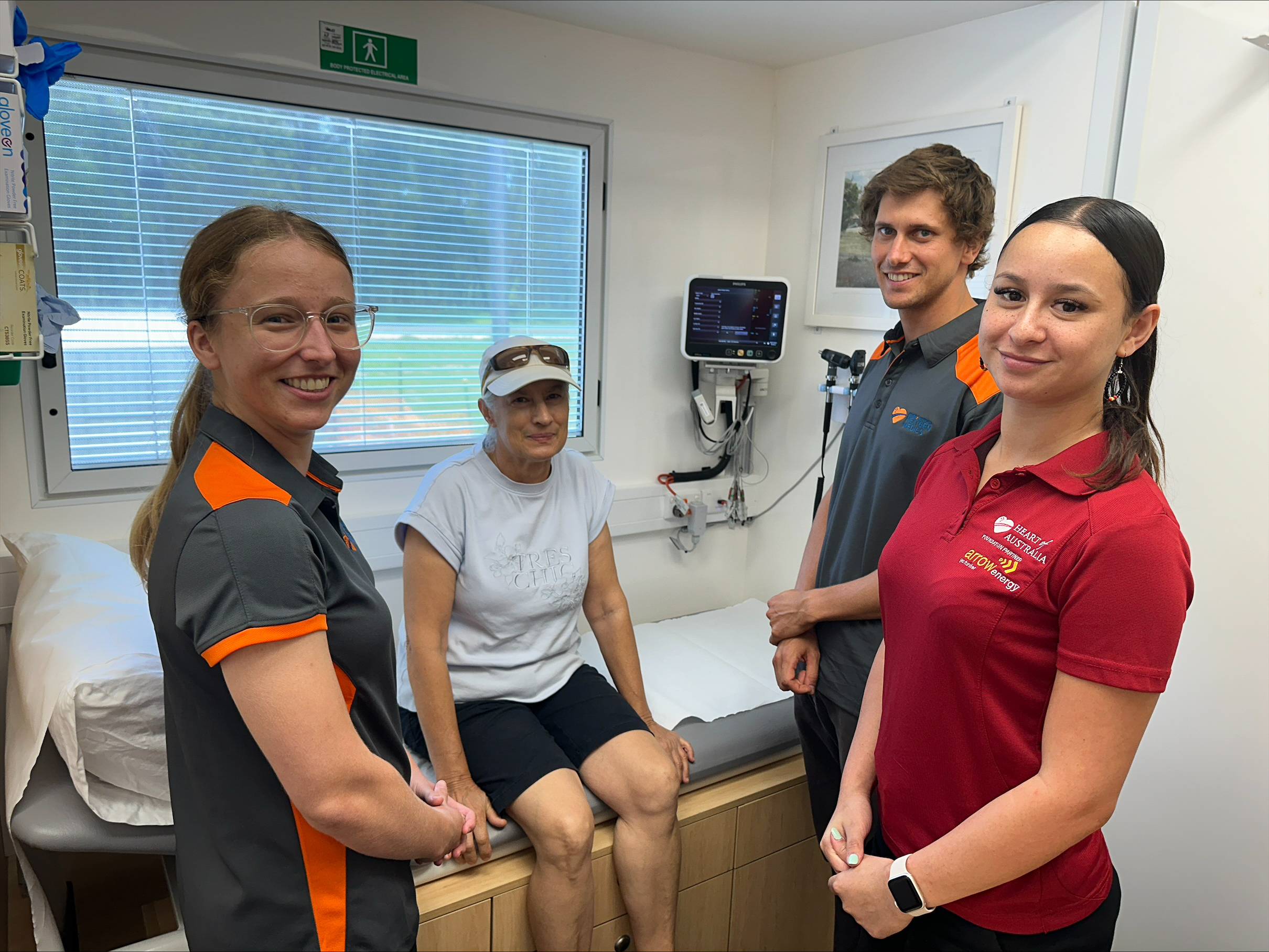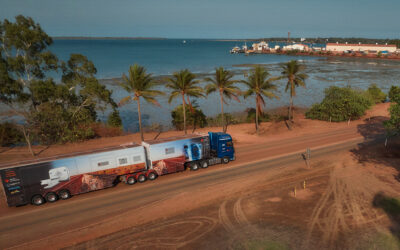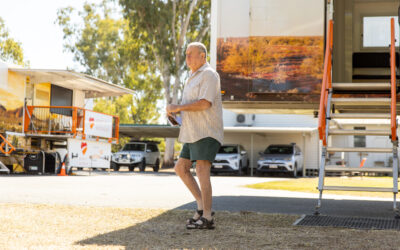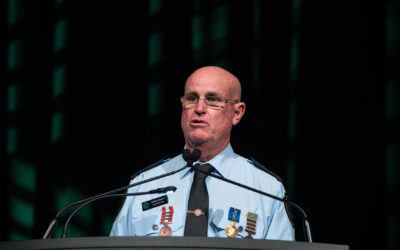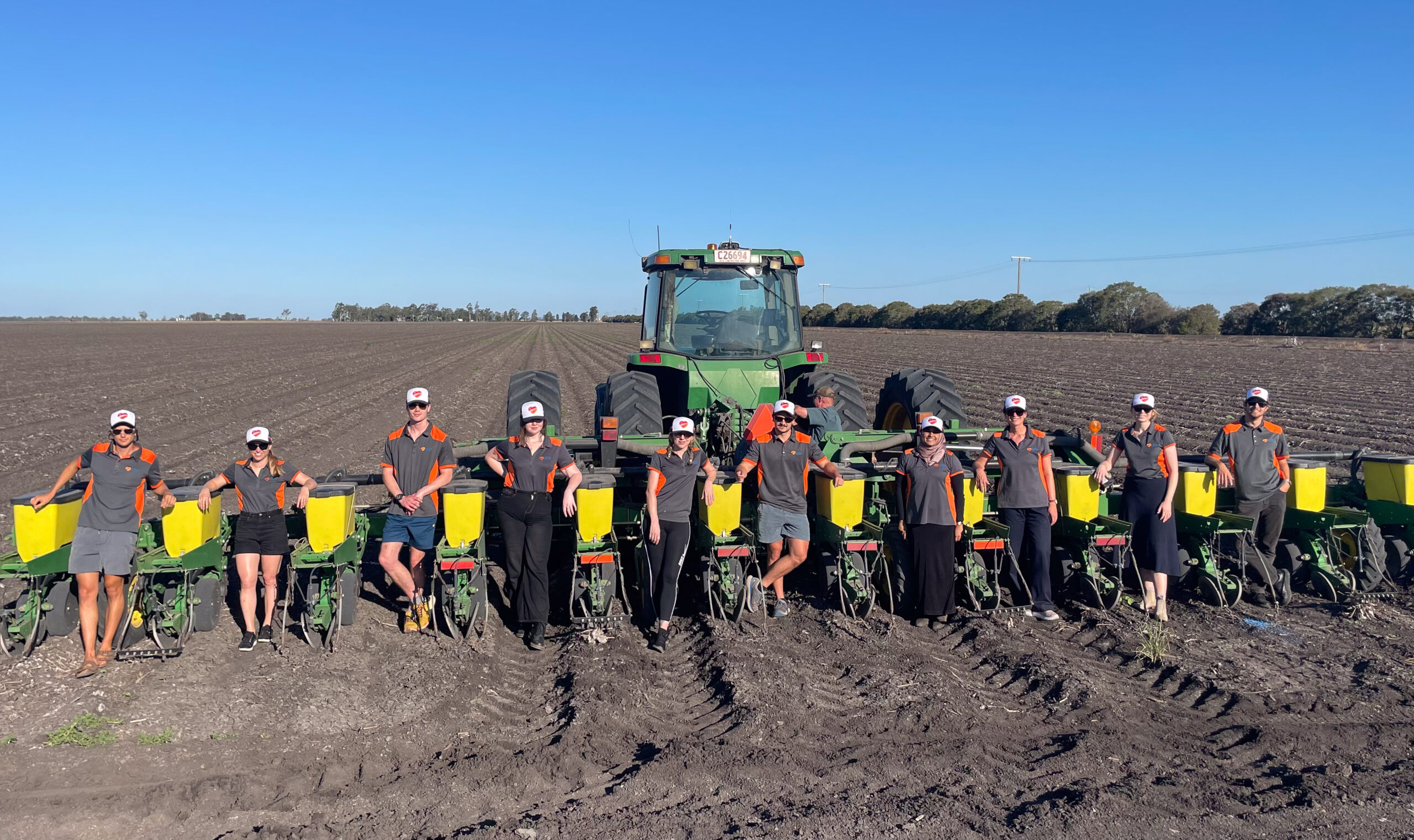
It was a whirlwind 10 days for Heart of Australia’s 7th cohort of NextGen Medics who completed their program in early December travelling first to Emerald, then onto Theodore, Dalby and Stanthorpe.
The unique scholarship program, which is supported by Boehringer Ingelheim, provided 10 medical and allied health students the opportunity to learn from Heart of Australia specialists, sonographers, radiologists, medical aides, and respiratory specialists in the field. They also engaged with various local health professionals within GP practices, hospitals, medical clinics, aged-care facilities, and Indigenous health organisations, to further understand how rural medicine is managed and how the Heart of Australia program integrates with local health services. Along the way, they absorbed the professional and personal stories of the practitioners they met, learning first-hand what a career in rural and remote Australia can look like.
While on the Heart Trucks, students were able to shadow patients, following them through each step of their appointment and observing the patient journey first-hand from consult, to testing, to diagnosis and treatment.
Off the trucks, the team were engrossed in the communities and industries that make up rural Queensland. From a personal tour of Anglo American’s Dawson Mine, to working dog demonstrations and presentations on advanced genetic testing in cattle, hitching a ride on a cotton harvester and learning the ins and outs of the cotton farming industry, connecting over Christmas lunch with the team from Goondir Health Services, and learning the long history of Theodore while cruising down the Dawson River.
Throughout the program students were tasked with writing reflections after each community visit, each echoing a similar sentiment that their experiences not only deepened their understanding of country patients and their needs but inspired them to continue pursuing opportunities in rural and remote communities.
Below are some of their reflections from their time on the road:
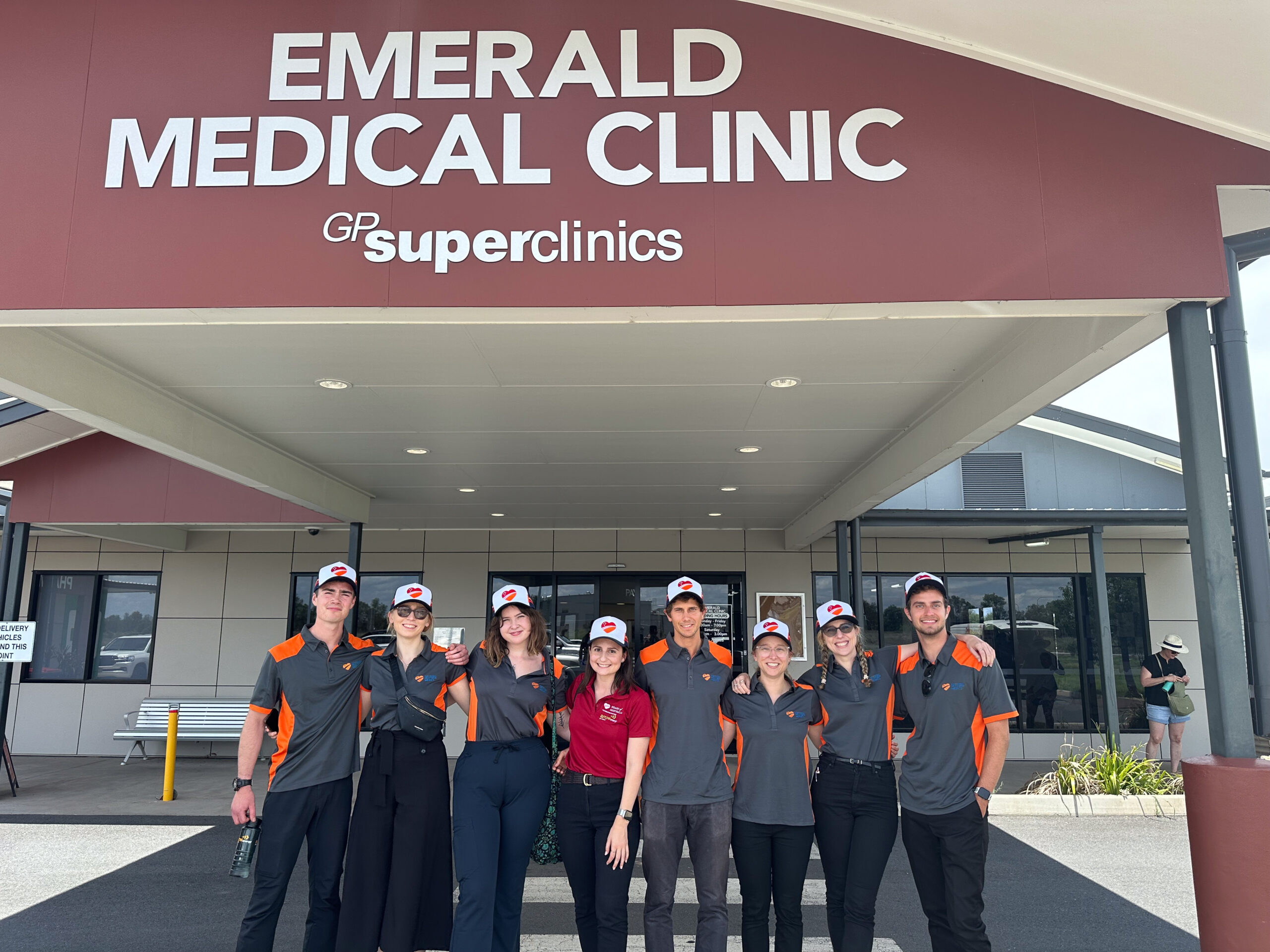
Emerald
It was an honour to have had the opportunity to spend time with the Heart of Australia team! Emerald was our first stop and the subject of this reflection. Emerald was the first place I had seen the Heart of Australia trucks in person, further it was the first time I had seen a mobile health clinic of this nature.
The first thing that struck me was the amazing design and innovation that these trucks were, and secondly the immense logistical operation that was needed to facilitate their effective use. Quickly after our arrival, the specialists arrived along with the patients and as the clinic began the management and organisation was apparent, the idea of connecting rural GPs and their patients with specialist services in their backyard was playing out, and it was amazing to see. From that point, we started meeting patients and following them through their consults.
For myself this was my first clinical interaction, and it was a great honour. I deeply appreciated the conversations we were able to have with some of these members of the community, and in addition the relationships that Dr Moolman and Dr Wyld had established. Despite the mobile nature of the service, it was apparent that longitudinal care and doctor patient relationships were still a priority.
In our time in Emerald, we also had the honour of meeting Dr McPhee and seeing the GP clinic there, and it was a pleasure to hear their story and understand some of the challenges that they had to overcome in their journey. These experiences have further inspired me to continue to pursue rural medicine.
Theodore
In my role as a dietetic student, talking with patients about their diets and food shopping in rural and remote communities has been an eye-opening experience. Patients undertake a 500km round trip monthly for affordable groceries, which sheds light on the pervasive challenges they face in accessing nutritious food. The high prices of local supermarkets force them to strategize, emphasising the significance of staple foods to sustain them until the monthly shopping trip.
The discussions highlighted the importance of addressing inequity and advocating for equity in food affordability, access, and availability as a future health professional, improving food security and diet quality, and reducing the disease burden of rural and remote communities.
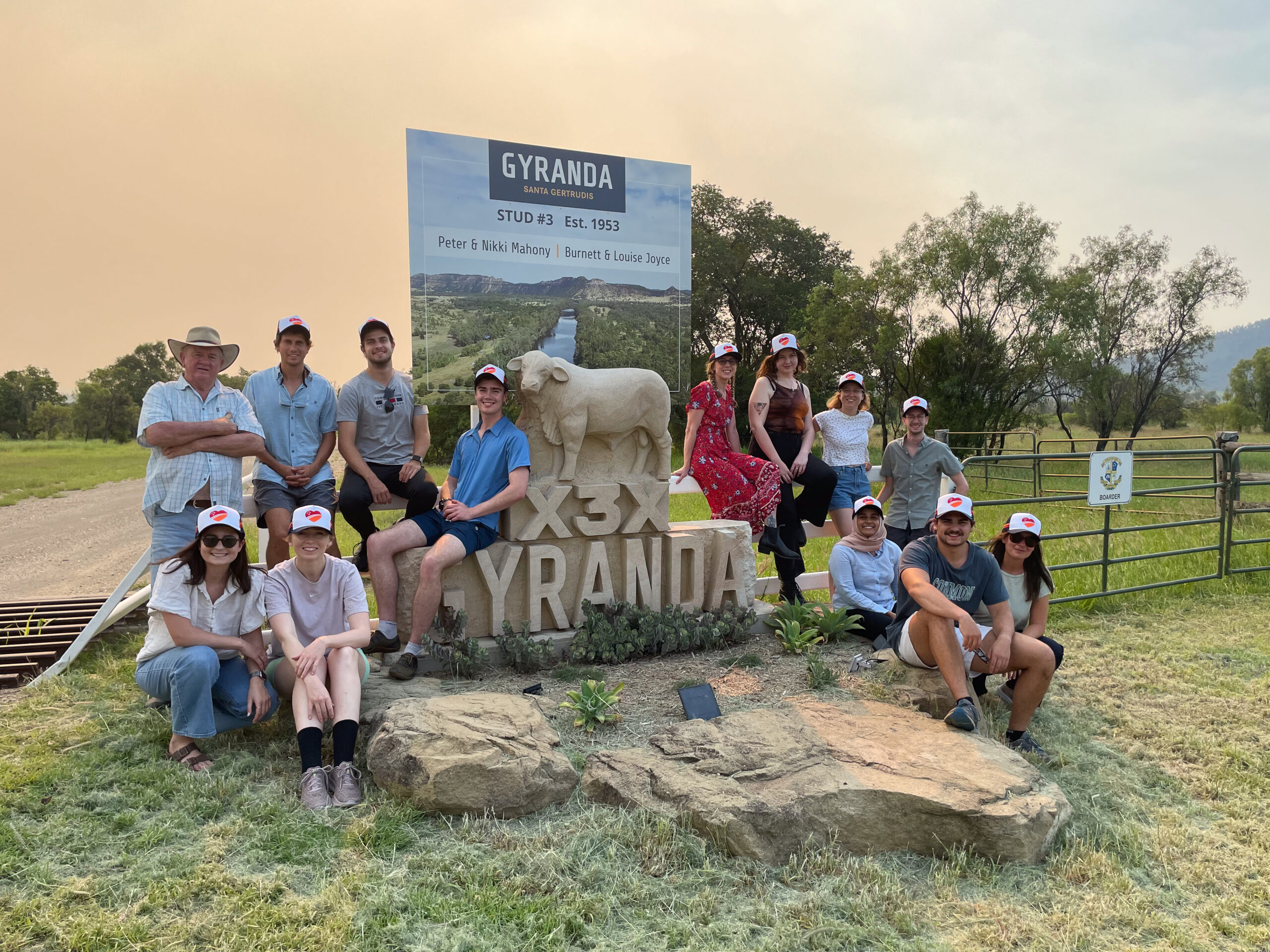
Dalby
While the Dalby segment of the Next Gen Medics program was less focused on clinical aspects than other parts of the trip, it offered a richer exploration of community dynamics as we explored Goondir, an Aboriginal Community Controlled Health Service, which highlighted the vital role of children in shaping the future of not just healthcare but the broader Australian culture.
We also ventured out of the town and into cotton territory, which was interesting as we learned about how much dedicated time the farmers put into their work, and I realised just how much conditions outside their control, like weather, can impact their physical and mental well-being.
Recognising that future clinical work might limit personal patient connections; these encounters emphasised the importance of understanding individual stories for a more humane approach to healthcare. Investing time to appreciate the broader context of patients’ lives humanises them and enables me to communicate better, becoming a more well-rounded doctor.
Stanthorpe
Although fatigued and saddened by the approaching end of our journey, it’s safe to affirm that the team had an exceptional time in Stanthorpe. On the first day, we divided into two groups. The first group embarked on a private tour of Stanthorpe Hospital, guided by the delightful Doctor James Telfer followed by a leisurely drive to Sutton’s apple farm and indulging in delicious cheese tasting at the local factory.
Meanwhile, the second group spent the morning on HEART 2, shadowing the incredible cardiologist Dr. Mugur Nikolai. The teachings were fascinating, and many of us had to be reluctantly pulled away at the end of the day to avoid being late for our team dinner. A heartfelt thank you goes to Sam Marino and the other volunteers at the Stanthorpe RSL Services Club for treating us to a delectable three-course meal. It was delightful getting to know and chat with all of you!
Our final day in Stanthorpe kicked off early, with most of us taking turns shadowing Dr. Nikolai’s consultations, observing echocardiograms, listening in on Teleconsults, and, for many, conducting our very first ECGs on patients. After a day filled with learning and engaging with patients, we hit the road back to Brisbane. The road trip became a shared space to reminisce about the wonderful experiences and jokes we had encountered over the past 10 days—moments that many of us will cherish for a lifetime.
